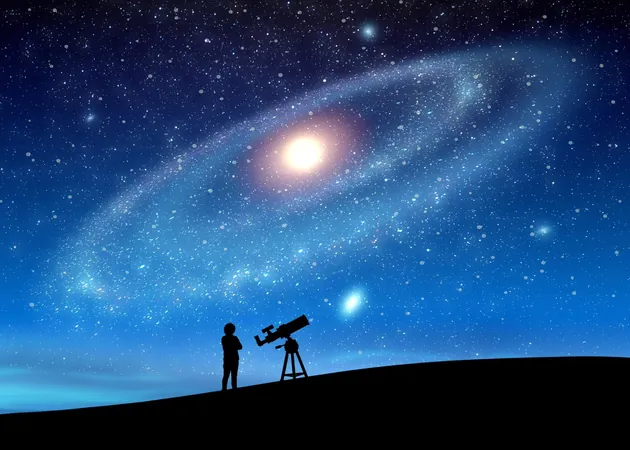
The Hidden Link Between Light Pollution and Our Fascination with the Cosmos
2024-10-08
Author: Nur
Picture this: you’re standing outside on a serene night, surrounded by darkness, and suddenly you're mesmerized by the twinkling stars scattered across the sky. This magical moment goes beyond mere enjoyment; it has the potential to spark a lifelong passion for science and influence your career choices.
Light Pollution's Impact on Astronomy Enthusiasm
Researchers from the University of Washington decided to dive into an unconventional topic: how light pollution affects people's ability to appreciate the night sky and, in turn, their interest in astronomy. Their groundbreaking findings could have significant implications for expanding access to science education.
Motivated by the effects of light pollution on human behavior, the researchers aimed to uncover how this environmental change influences our emotional connections to the universe. While light pollution has been extensively studied in fields like biology and environmental science, its impact on emotional and social aspects has been largely overlooked.
Opening Doors to Scientific Discovery
This intriguing research was spearheaded by Rodolfo Cortes Barragan and Andrew Meltzoff from the UW Institute for Learning and Brain Sciences. They pointed out that until modern times, humans had easy access to a star-studded sky, which provided everyone with equal opportunities to marvel at astronomical phenomena. Today's light pollution, however, creates disparities in that experience, potentially influencing how individuals connect with science.
Cortes Barragan and Meltzoff hypothesized that reduced exposure to light pollution would likely correlate with increased interest in astronomy, which often serves as a gateway to broader scientific pursuits.
The Power of Wonder
One of the key themes of the study was "wonder"—the complex blend of awe and curiosity that can inspire people to explore the cosmos. A survey of over 35,000 residents from the U.S. aimed to gauge this sense of wonder. The analysis revealed a striking relationship: individuals living in areas with minimal light pollution reported significantly greater feelings of cosmic awe compared to those in heavily illuminated regions.
More importantly, this sense of wonder was directly linked to a behavioral interest in astronomy, as evidenced by actions such as conducting Google searches related to astronomy or applying for positions like NASA astronaut.
Bridging the Gap: Dark Sky Access
These findings underscore a critical yet often ignored truth: equitable access to the night sky is a key element in nurturing scientific curiosity. Geographic locations, particularly in the United States, define how much exposure people have to the unspoiled night sky— and this, in turn, can heavily influence their motivation toward scientific endeavors.
Safeguarding Our Celestial Heritage
The researchers aspire to stimulate interdisciplinary collaboration between psychology and astronomy, aiming for a greater appreciation of both celestial wonders and human experiences. As encroaching light pollution threatens locations that used to be sanctuaries for stargazers, this study emphasizes the urgent need to preserve these awe-inspiring views.
Imagine growing up unable to witness the magnificent sweep of the Milky Way. That void could stifle not only our connection to the universe but also dampen the drive to seek knowledge about it.
Initiatives to Combat Light Pollution
Current efforts to tackle light pollution—through the use of shielded outdoor lights and the establishment of dark sky parks—are not just about preserving our visual treasure troves. They also promote inclusivity, allowing individuals of all backgrounds to experience that intrinsic spark of wonder that can inspire the next generation of scientific thinkers.
Programs designed to introduce astronomy to urban youth, often deprived of opportunities, could play a pivotal role in fueling their passion for space exploration.
Ultimately, the researchers hope their work motivates us all to recognize the intrinsic value of the dark skies above and the need to protect them. By safeguarding these dark expanses, we’re not merely preserving our starry vistas—we're nurturing the curious minds of tomorrow, poised to lead us to new frontiers of understanding. A single mesmerizing night filled with stars can indeed spark a lifetime of inquiry and discovery!
The full findings of this fascinating study are detailed in the journal Scientific Reports.
Stay curious!


 Brasil (PT)
Brasil (PT)
 Canada (EN)
Canada (EN)
 Chile (ES)
Chile (ES)
 España (ES)
España (ES)
 France (FR)
France (FR)
 Hong Kong (EN)
Hong Kong (EN)
 Italia (IT)
Italia (IT)
 日本 (JA)
日本 (JA)
 Magyarország (HU)
Magyarország (HU)
 Norge (NO)
Norge (NO)
 Polska (PL)
Polska (PL)
 Schweiz (DE)
Schweiz (DE)
 Singapore (EN)
Singapore (EN)
 Sverige (SV)
Sverige (SV)
 Suomi (FI)
Suomi (FI)
 Türkiye (TR)
Türkiye (TR)